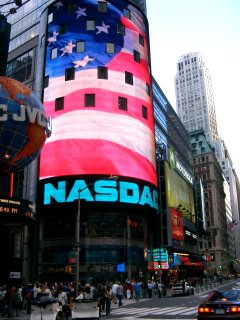. : About me : .
Name::Trade Monkey
From::Middlebury, Connecticut, United States
Email Me!
View my profile
. : Recent Posts : .
The Yen Also Rises
Imports From China Aren't Pricier -- Yet
Further evidence that the Fed may be done tightening:
Google Finance Launches
Rising Wages in China
Punish Me Please!
Et Tu Francé?
That's Because They're a Pack of Pikers!
Discrepancy in USD/CAD Fundamentals
Normalizing Yield Curve?
. : Archives : .
February 2006
March 2006
April 2006
May 2006
June 2006
. : Tools : .
. : Fin/Econ Links : .
. : Misc Links : .
Atlas Shrugs
Belmont Club
Cato Institute
Foreign Dispatches
Instapundit
Kim Du Toit
MIT OpenCourseware
Oxblog
Protein Wisdom
Samizdata
Templates By Caz
TCS Daily
Truth on the Market
Volokh Conspiracy
**View my Wish List**
. : Credits : .
Template By Caz
Powered by: Blogger
Saturday, March 25, 2006
The Single Market is Near!!
Wharton has a great piece on the looming merger of the NASDAQ-LSE and its meaning in the larger context of market consolidation.
Some notable points:
"There's an obvious advantage in centralizing exchanges," says Wharton finance professor Richard J. Herring. Bigger exchanges enjoy economies of scale that reduce trading costs. That attracts more traders and listing companies. And as trading volume increases, it's easier for buyers and sellers to find one another. The improved liquidity helps share prices respond more quickly and accurately to changes in supply and demand.
"Part of the reason this is happening is that there is a drive to have a single market in financial services," says Franklin Allen, professor of finance and economics at Wharton. "That's a big thing in Europe. At the moment, they have far too many exchanges. Clearing and settlement [bookkeeping to complete transactions] aren't nearly as smooth as they should be, and transaction costs are too high." Allen estimates there is a 60% to 70% chance the LSE will merge with Nasdaq....
Of particular note is the role that (excessive?) regulation has played in the drive toward market consolidation:
The Sarbanes-Oxley law enacted in the wake of the Enron scandal, for example, requires expensive new auditing procedures and makes chief executives and chief financial officers legally liable for the accuracy of their firms' financial statements. "The Sarbanes-Oxley requirement has made it pretty unattractive for companies who haven't already listed here to choose the U.S.," Herring says.
In addition, Blume notes, many institutional traders are unhappy with the so-called "trade-through" rule in the U.S. "It causes an integration of all the markets and that's a very expensive thing to do, and institutions don't like it." The rule involves a National Market System (NMS) that links exchanges around the country so that traders get the best prices available anywhere. A buyer placing an order through the NYSE might, for example, be matched with a seller on the Nasdaq or Philadelphia exchange if that seller offered a lower price than anyone on the NYSE.